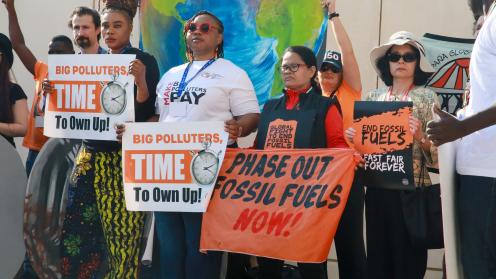How far can you stretch an expression like “better late than never”? In the case of Article 6 of the Paris Agreement, on cooperative implementation, the answer seems to be: quite a long time. Over nine years after the adoption of the Agreement, the article is still not fully operational, and there is growing frustration on all sides at the lack of progress. Both party and non-party stakeholders alike are waiting with bated breath to see what progress the June Climate Conference will achieve with regard to this “problem child” of the Agreement.
Want to dig deeper into today's talks? Read the full Earth Negotiations Bulletin daily report.
As discussions continued on Tuesday, negotiators wrestled with the outstanding questions that need to be answered before Article 6 is fully operational. How should countries authorize cooperative approaches and Internationally Transferred Mitigation Outcomes (ITMOs)? Can those authorizations be revoked? Are fiscal instruments like carbon pricing “non-market approaches,” or should they be considered a kind of carbon market?
With the end of this round of negotiations in sight, agreement at the Conference of the Parties (COP) in Baku seems uncertain—and not just on Article 6. Negotiations on the Mitigation Ambition and Implementation Work Programme and the Just Transition Work Programme were unable to find agreement, meaning that the respective Co-Facilitators will draft procedural conclusions: documents stating that parties met and discussed, but that do not capture any views that can be used as a basis for further negotiations.
Not all workstreams ended this way. Several rooms, such as those working on agriculture, were able to finish their negotiations successfully. Others, such as those working on the Global Goal on Adaptation (GGA) were still eager to reach agreement before the end of the conference.
Mandated events also continued apace: the annual Dialogue on Ocean and Climate Change showcased ongoing and planned strategies for addressing the ocean-climate change nexus in an integrated and holistic manner. The discussions drew linkages to other UN processes, such as the 2025 UN Ocean Conference and the recent adoption of the Agreement on the Conservation and Sustainable Use of Marine Biological Diversity of Areas Beyond National Jurisdiction.
To receive free coverage of global environmental events delivered to your inbox, subscribe to the ENB Update newsletter.
All ENB photos are free to use with attribution. For the Bonn Climate Change Conference 2024, please use: Photo by IISD/ENB | Kiara Worth.

























































